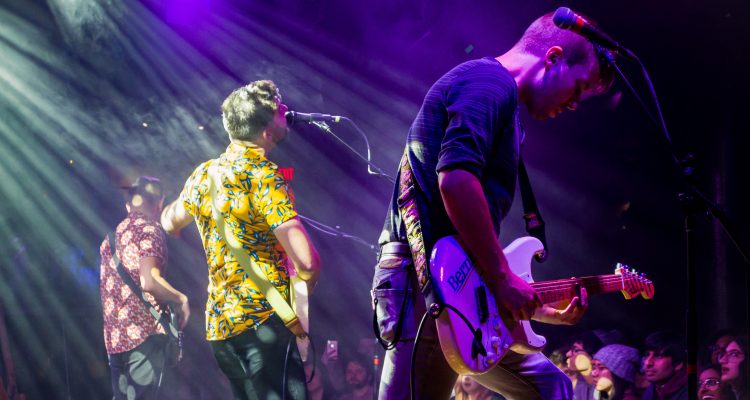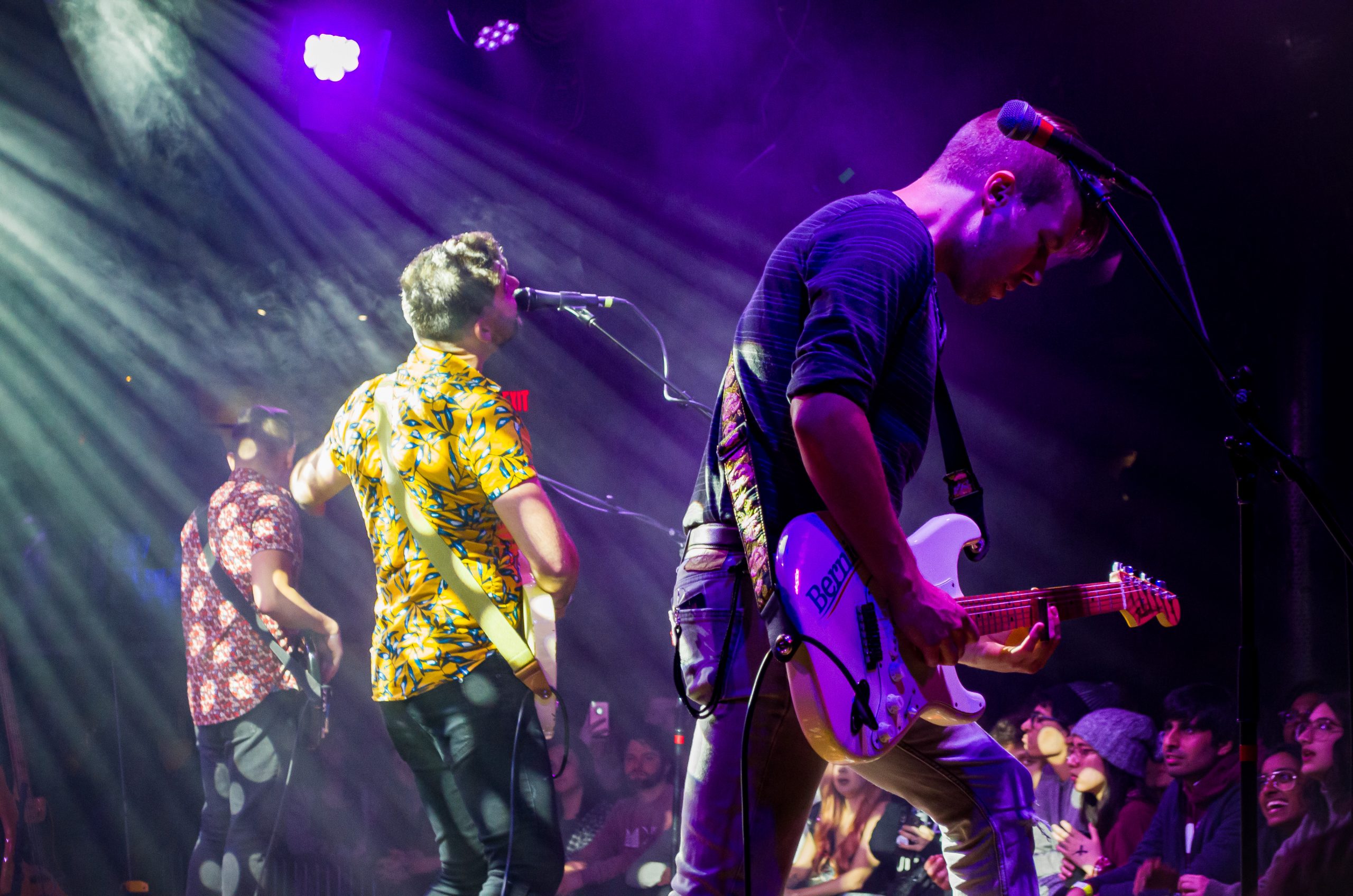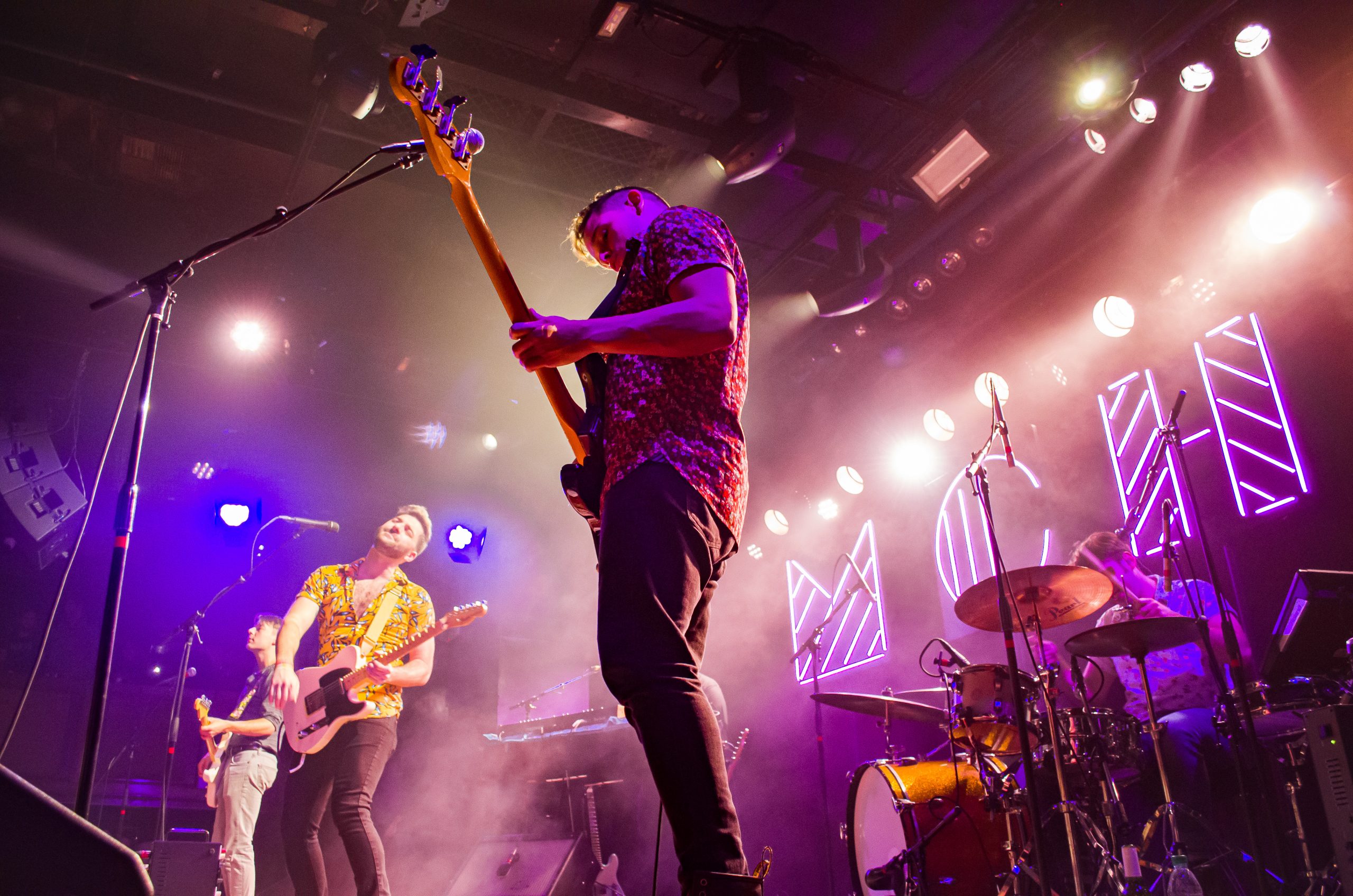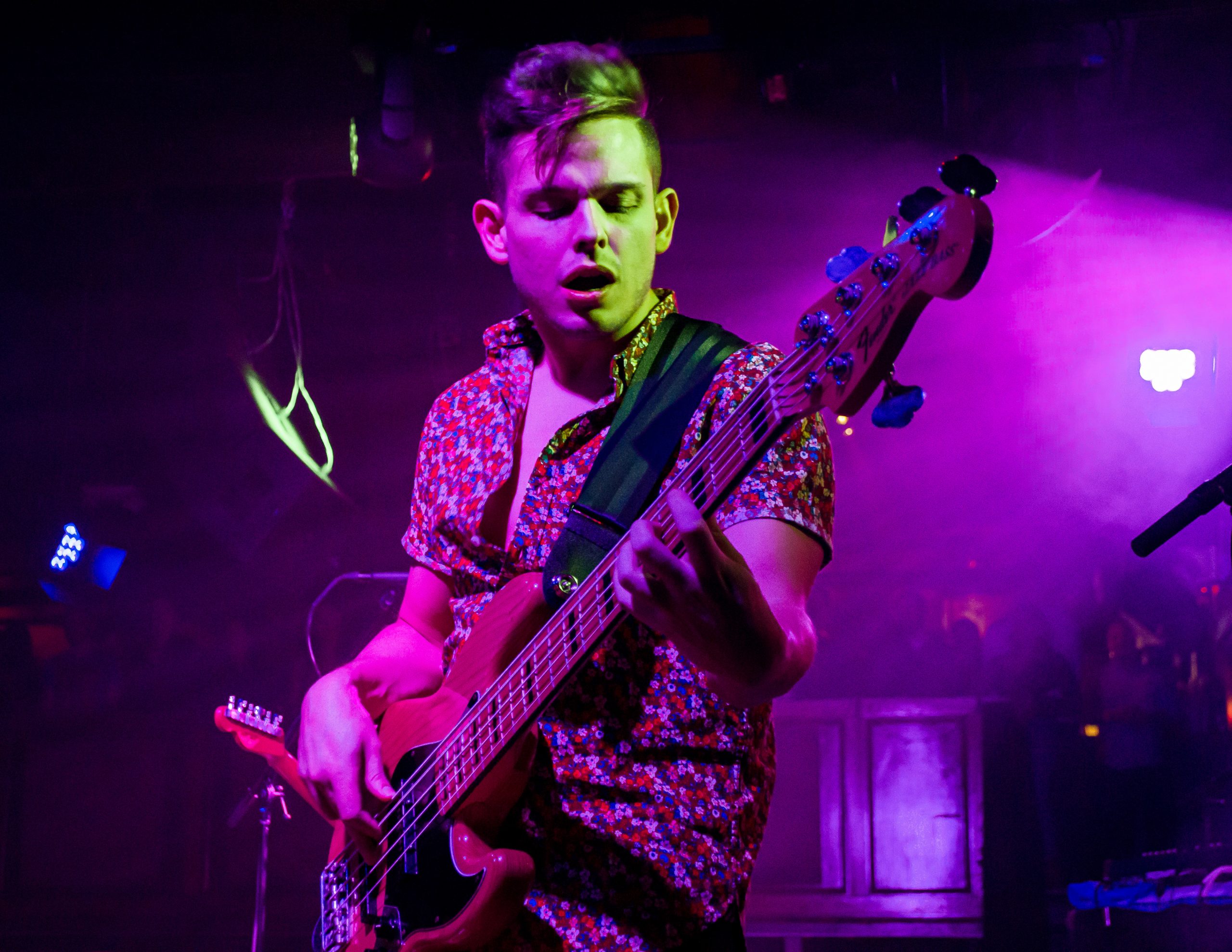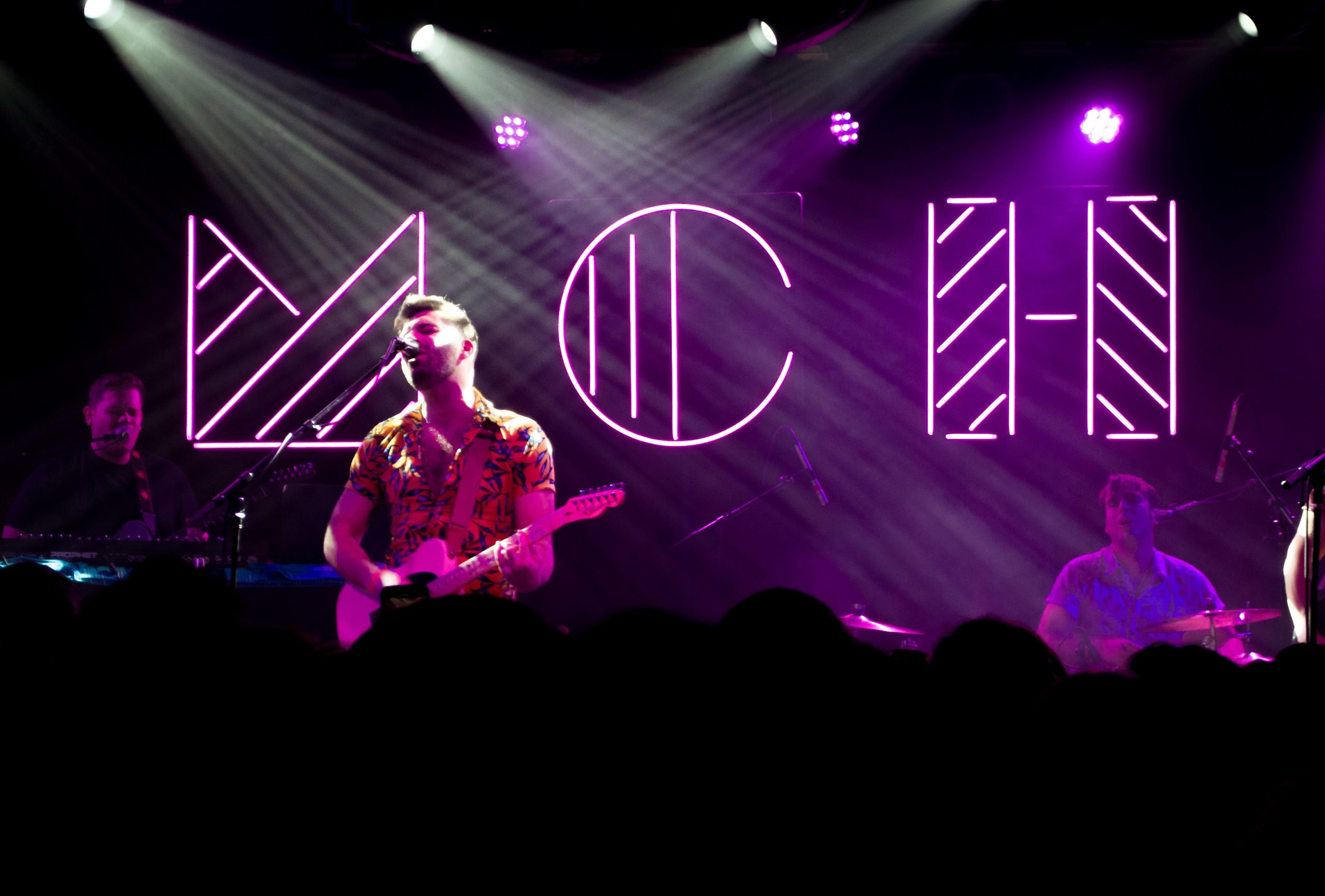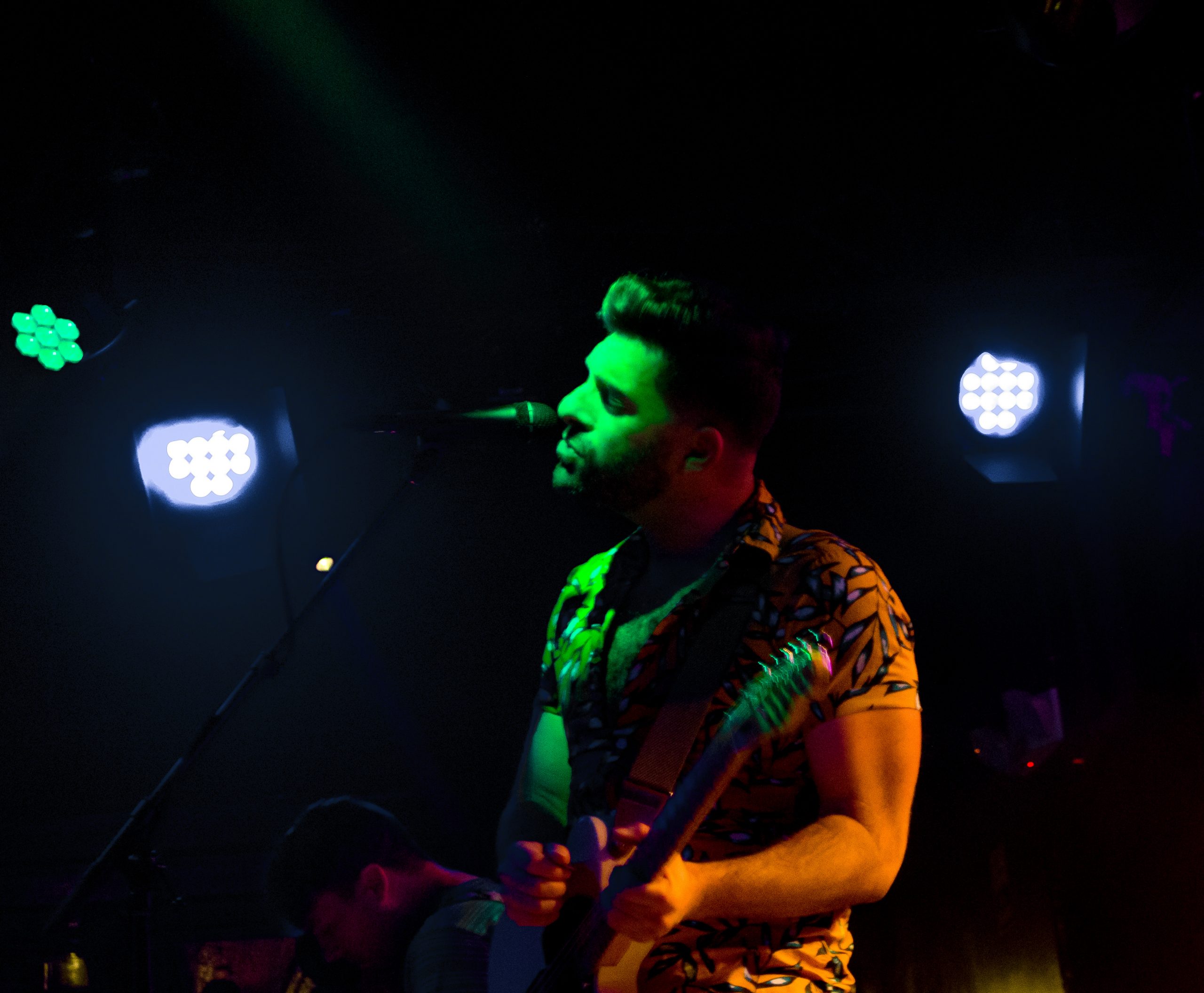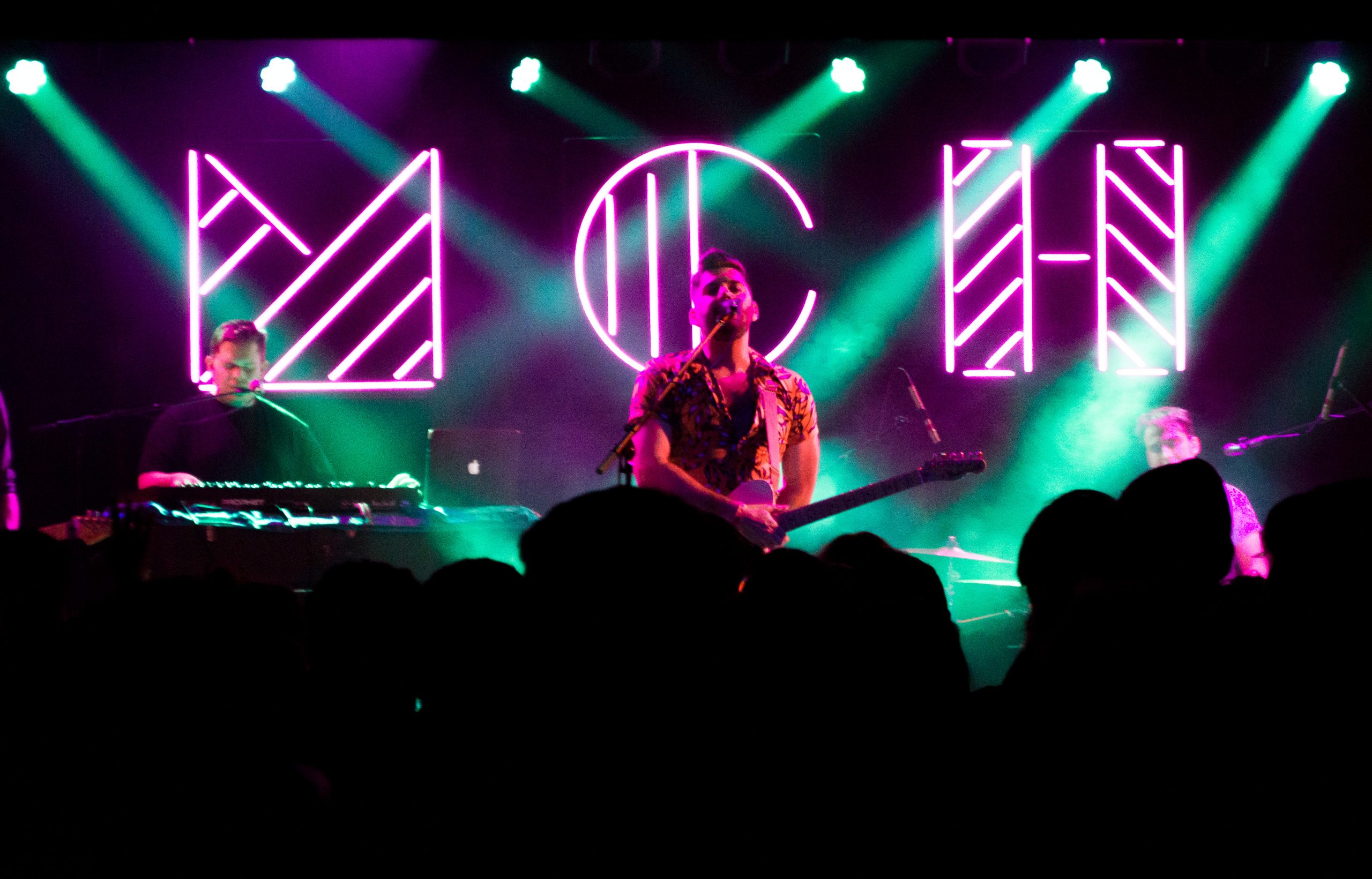WHUS had the wonderful opportunity to talk to Robby Hunter, Pat Howard, and John Coughlin from the Indie Funk band Magic City Hippies before their show at Paradise Rock Club on the Boston stop of their Modern Animal tour.
By: Rita Plante
From the streets of Miami, to some of the most in demand venues and festivals in the country, the band Magic City Hippies has been spreading the Indie Funk sound since 2013. Through the use of electric guitars, keyboards, and synth their self-titled debut album blends hip-hop, pop, funk, and beach-bum to define their self made Indie Funk genre. The Hippie Castle EP featuring the Spotify Global Top 50 chart topper “Fanfare”, is soaked in a groove that you can’t help but dance to.
With a strong and unique sound setting them apart from the crowd, they have found a lot of success touring. However, there is a lot that the audience doesn’t see happening behind the scenes during tours. Their 2019 sophomore LP Modern Animal explores the hardships of touring and how it affects the bands lives and relationships, but it dresses it up in upbeat, indie funk beats.
I sat down with the three founding members of Magic City Hippies to talk about their new album, their winter tour, and how growing up in Miami has influenced their style.
Photos: Rita Plante
RITA: How did you guys meet and start forming the band?
PAT: Robby was a one-man band for a while before any of us met and he basically ended up getting threatened by the cops because he would stir up quite a crowd on the corner of the main intersection.
JOHN: So, he started playing the Barracuda bar with a rotating cast of musicians. Pat just got thrown into the spinning wheel.
PAT: We only met about fifteen minutes before playing our first show. Then I moved in with John, and we needed a bass player, so we just started playing all these random shows in Miami together, kinda unrehearsed. We played Barracuda bar every Friday for free beer and maybe thirty bucks in tips.
JOHN: Magic City Hippies kinda evolved from this live trio setup up to the five of us including the Bellisario brothers [touring members] on bass and keyboard. All the recorded music kinda starts in Robby
’s head, then goes past the producer Pat. It started with the initial pairing of the two and I just kinda completed the three.
RITA: And what is the significance of the Magic City Hippies name? I know Miami is the Magic City, but what does it mean to you as a band?
PAT: Miami is the Magic City.
JOHN: Basically, we had this house which was already called the Hippie Castle by our friends, it wasn’t a thing we tried to make happen. We were all in music school, always hanging, people would just walk in without knocking, always jamming to some Beatles music. Pat converted his room into a studio, there was a party pool out back, it was just kinda this vibe. Our friends who weren’t musicians would just come over and shake their heads and go ‘f**kin’ hippies.’ So one day we just all came together and came up with the name, at the time we were the Robby Hunter Band, but we didn’t have the ganas to change our name so we just named our first album Magic City Hippies, but eventually we worked up the nerve and changed it to Magic City Hippies.”
RITA: So you said your house was named the Hippie Castle?
JOHN: Yeah
RITA: Isn’t that the name of your EP?
JOHN: Yeah, it’s all a grand mythology right?
ROBBY: The cover is actually a photo of our backyard at the place.
RITA: So your first LP Magic City Hippies and your EP Hippie Castle kinda blend into each other; does your latest EP Modern Animal fit into the story anywhere?
PAT: Modern Animal is more of a road inspired record.
JOHN: For the most part, the EP and The Robby Hunter Band together are our first body of work, and they say the second album is about everything that happened between your first and second album. Modern Animal is more about what happened in the past year or two on the road, relationships, you know.
RITA: So you said Modern Animal had a lot to do with touring, has writing about touring at all effected how you guys tour today?
ROBBY: It really affected our personal lives and our relationships. If we learned something it was to give our girlfriends more time.
PAT: The world keeps spinning when you’re on tour. It’s easy to fall into the routine of taking everything day by day, but you still need to tend to your life and other goals that are kinda peripheral to touring. So there were a lot of challenging things about that, we just dressed it up in some funk.
JOHN: It’s not a sad sounding record. Modern Animal is a metaphor. After riding around for a month on tour, you start to feel invincible, I could go out there and roar like a tiger and people would clap their hands, instead of saying ‘why is that guy making that noise,’ you get that confidence eventually.
RITA: How has coming up in Miami influenced your band’s performance style?
PAT: Miami is a party city, and it’s a very Hispanic city, and with that combination, you know, the music has to be very dance oriented, not in an EDM way, but the basis in the pyramid of needs in the music in Miami is groove. The music needs to make you feel really good and it needs to make you move.
RITA: So do you try to bring that groove to everywhere around the U.S. when touring?
JOHN: Oh yeah it’s amazing! Some places you can tell that they don’t get a lot of it, Utah is like, ‘We love funk bands! They just don’t come through here as often.’
ROBBY: Even our slowest songs still have a groove. Like you can maybe dance to it, slowly.
RITA: Does it vary how into the show the audience gets from city to city? Does your hometown of Miami get more into the dance groove? Do other cities even compare?
JOHN: The south is really lit, which is usually a lot of fun. We just played New York City last night, which is always a good time. West Coast, they eat that sh*t up; they’re all hippies out there too.
ROBBY: Lately we’ve been overwhelmed everywhere.
JOHN: We were surprised in Kansas City, they were one of the first places in the Midwest to get really turned up for us, for kinda no reason.
RITA: Is there any city that you are particularly excited to visit on the tour?
ROBBY: New York was one of them.
PAT: LA for sure.
JOHN: Every national tour there’s two poles, the New York show and the LA show, as long as you nail those two you have a lot of breathing room in the middle. Everything leads up to the New York show, you play it and then the next thing you know you find yourself in Los Angeles and the New York show feels like years ago, and you’re like ‘this is the biggest show of my life. this Los Angeles show right now.’
PAT: We’re playing in Toronto and Vancouver for the first time.
JOHN: Officially a North America tour, two gigs outside the United States.
RITA: Are those your first shows outside of the US?
ALL: Yes.
RITA: Do you plan on playing in any other countries soon?
PAT: We dream of it.
JOHN: We don’t have any plans in the works yet, maybe a Canadian run? Living in Miami, we have a lot of connections to Latin America and I think we could really crush it doing a South American tour. We hope to get to Europe someday. I’d love to do a world tour and smash an expensive guitar on the last night.
RITA: What would you say is the significance of live performance? Is there a message that you guys try to get across that you can’t exactly do on recorded music?
PAT: Energy. Regardless of any mistakes we make throughout the night, the intention is what matters the most. You can tell how much we are putting into it and if we get it back from the crowd, it’s just this feedback loop.
ROBBY: Yeah you can’t get that on a record.
JOHN: I was talking to a fan the other day and he said it’s kinda like Kirby from Super Smash Bros: we eat the crowds energy and then we become their energy and we shoot it back at them.
RITA: How would you say that the themes have changed from your first album to your second album? For example the lyrical style.
ROBBY: It’s similar. We are trying to make quote-unquote Indie Funk music, were trying to keep that alive, so we have a lot of motifs that we kept from the earlier album and we put it back into this album. It’s a very nostalgic thing, at least for us.
PAT: We like to throw in little teasers like the “Fanfare” melody, and then a new melodic motif. Sound-wise, every year there are new amazing records that come out and we get really into the newest project from the bands that we’ve always loved and find ourselves inspired by their work. For example, in between the EP and our latest album, I got really in the Unknown Mortal Orchestra and we put that kinda vibe on there, you know, Tame Impala, The Red Hot Chili Peppers.
JOHN: But there’s not like a big shift; there is a continuation of the initial indie funk. Basically it is whatever the three of us have devoured in our lifetime and whoever can play the best guitar part, that’s what gets put on the record. The music were making now, of course feels like the music we were making five years ago but it’s still different.
ROBBY: Not all of them are dance songs anymore.
JOHN: Right, we have a true ballad on there. It’s definitely expanded the sound a lot more.
ROBBY: There’s a lot more warbly or synthy sounds on there.
PAT: There’s definitely a lot more synth, we were in a studio, we had a lot lying around and we’d been listening to synth music.
JOHN: It’s also kinda psychedelic, not like we are a psychedelic band, but in the way that every sound makes you have to go, ‘oh sh*t did you hear that’ which is I think the goal of most psych-rock. And we want that effect so every sound is hyper focused and thought out from a keyboard part to the snare.
RITA: So all of your music is 100% independently made, why do you consider that to be so important in your creative process?
PAT: Well it’s required
JOHN: Well it’s kinda in the sense that we get to own everything, but also all the best things that we’ve made come from the three of our brains together. We are still open to collaboration and trying things with other people, but anytime we’ve strayed too far away from working just the three of us, things get slowed down and the creative process starts not really working. When it’s just the three of us in the studio, that’s where the magic happens.
RITA: Last question, if you had to recommend one song off Modern Animal that was not released as a single, which one would you pick?
JOHN: We released almost all of them as singles so you really narrowing our options, but I really like Float, I get really emotional when I hear the guitar solo at the end, it feels really reflective of the year I was having, which is a very personal thing that obviously the listeners won’t have the same experience.
PAT: “Kamikaze” is our dub reggae song on there. We listened to a lot of Bitty Mclean and one album of his samples old Treasure Isle records from the 50s or 60s. We wore that stuff out, which ended up kinda injecting itself into our music.
ROBBY: I would say “The Wind” just because it’s a very personal song for me, Pat has this ending part that almost makes me tear up.
Magic City Hippies’ sophomore LP Modern Animal is out everywhere now and they will be touring North America until February 28th.


